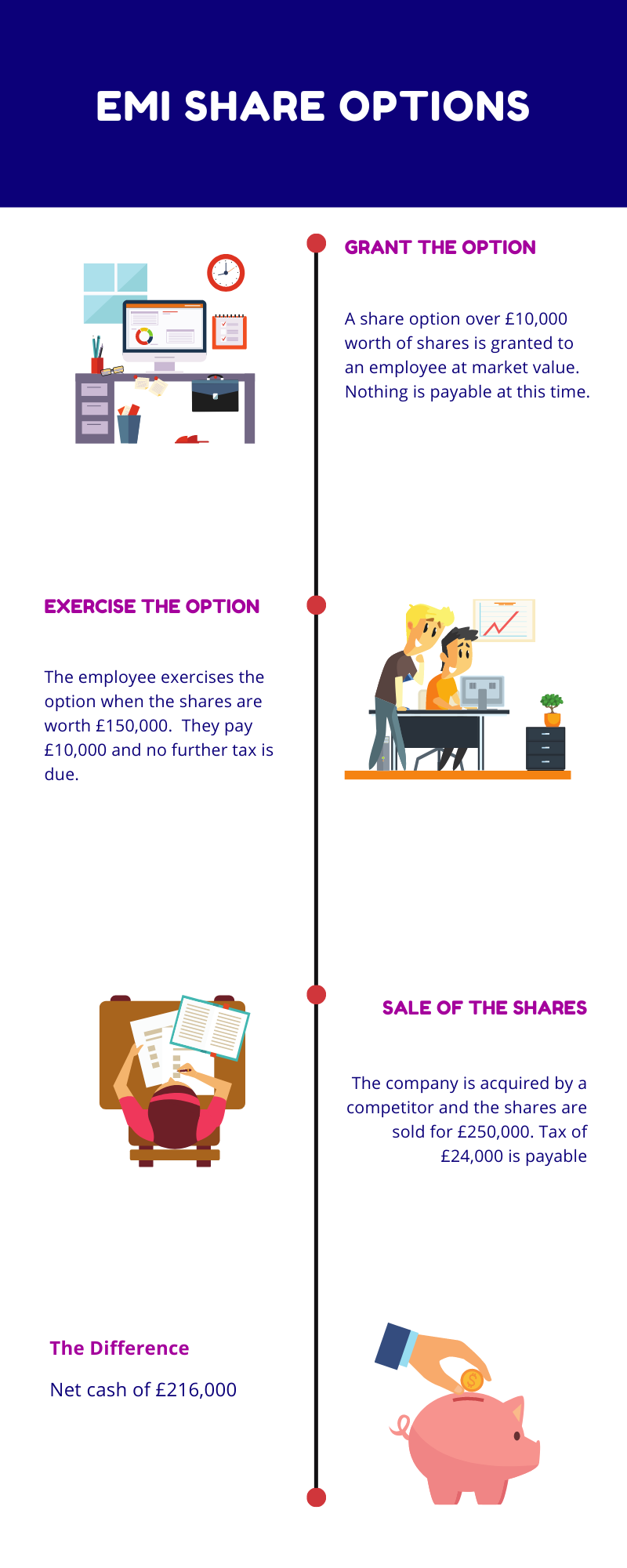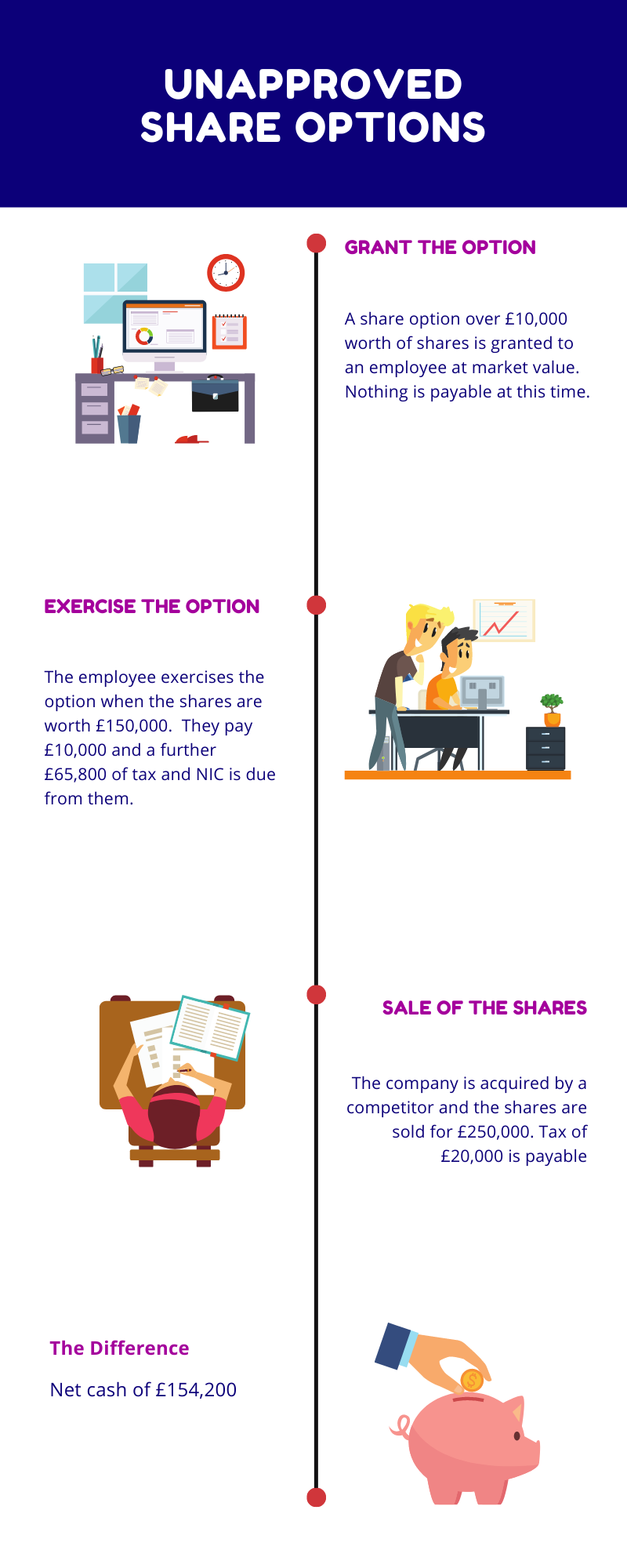An EMI Share Scheme: What you need to know
Incentivisation of employees is an important concern for employers who want to retain their key people and EMI share schemes is a tax efficient way of allowing employees to obtain a share in the company. Many employees want to share in the ownership of the company so they can benefit from an eventual sale.
From the employer’s point of view, an EMI share scheme is effective because it does not involve paying bonuses to staff and so there is no pressure on cash flow. A deduction from taxable profits can also be claimed for the value of the shares given for free, if employees do not pay for them.
EMI is an HMRC approved scheme designed for UK based, small and medium sized businesses. The scheme is flexible and the ability to exercise the share options (i.e. converts them into actual shares) can be based on conditions such as performance or length of service.
The key benefits of EMI are that key employees are retained; employees’ interests are aligned with those of the company, and the scheme is likely to result in a committed and motivated workforce.
Click Here to download your complete guide.
Where the criteria for EMI are not met, there are some alternatives:
Growth shares
Where companies cannot use EMI, a growth shares are often used instead. Under this share scheme, on a sale of the company, employees benefit from only the growth in the value of the shares going forward, not the historic value built up until the date of share issue. This is achieved by valuing the company and issuing shares of a different class which only benefits from value above an agreed threshold.
For instance, if the company is worth £10m, a growth share may allow the holder to share in the proceeds, only if they exceed £12m. As such, the value of the growth share on issue would be very low. This is because it does not have the right to any of the value built up thus far. The income tax charged on acquisition of the share would consequently be very low.
Phantom share schemes
A phantom share scheme is essentially a cash bonus scheme. It allows an individual to receive a cash payment equal to the value of a share or the increase in value of a share above a notional exercise price: no actual shares or share options are issued. Individuals are incentivised because the level of any payment is linked to the increase in value of the company’s shares.
How do share options work in the UK?
In the UK, the gift of shares to an employee or director is taxable. This leads to an income tax bill for the recipient and potentially a liability for National Insurance Contributions. This also applies where a share option is exercised and converted into shares. HMRC has approved four share option schemes which mitigate tax charges on issue of shares:
- Enterprise Management Incentive (“EMI”)
- Company Share Option Plan (“CSOP”)
- Share Incentive Plan (“SIP”)
- Save As You Earn (“SAYE”)
SIPs and SAYE tend to be used by very large organisations and must be made available to all employees. An EMI share scheme tends to be the most attractive scheme where the criteria are met to make it available. It allows up to £3m of company share options to be issued to employees with a limit for each individual of £250,000.
What is an EMI share scheme?
Employers often want to use share schemes to give employees shares as a way of incentivising them to remain with the business. An EMI share scheme is an HMRC approved, tax efficient way of rewarding employees by giving them a share in the company.
How do EMI share schemes work?
Under the EMI scheme, options are issued over an agreed number of shares. No tax is paid when the option is granted. When it is exercised (which means converted into shares), there is no tax to pay, provided the agreed exercise price is no lower than the market value of the shares on the day the option was granted.
When the shares are sold, the capital gain is usually taxed at 10% where Business Asset Disposal Relief (previously known as Entrepreneurs Relief) is available.
Do EMI share shares qualify for Business Asset Disposal Relief (BADR)?
Broadly speak, BADR can be claimed if:
- the EMI option was granted more than two years prior to the disposal of the option shares;
- the option holder was an officer or employee of the company or a subsidiary in the two years prior to the disposal; and
- The company was a trading company or the holding company of a trading group subsidiary in the two years prior to the disposal.
The 5% holding tests do not apply to options held under BADR.
Why EMI?
While there are a number of choices as set out above, the EMI share option scheme is a Government approved, tax beneficial and very flexible way of incentivising your staff.
In a nutshell, EMI is generally the best type of share scheme for employees and the company.
Tell me more
Click on the links below for more information.
What we do
- You can outsource the entire process to us making it as straightforward and painless for you as possible.
- Our combined team of tax advisers and lawyers will build an EMI scheme that is tailored to your needs.
- We deal with everything from start to finish including HMRC advance approval, agreeing the valuation with HMRC and the drafting of the option agreements.
- All for a fixed fee.
More Information
For further information on the EMI Scheme please subscribe to the relevant Topic below or Contact Us for a free, no obligation meeting.
Contact Details:
More Information
To be eligible to offer an EMI scheme, the company must:
- be independent (not owned by another company);
- only have ‘qualifying subsidiaries’, defined as a company in which the EMI company owns at least 51% of the shares;
- have gross assets of less than £30m;
- have fewer than 250 employees;
- be carrying on a trade which is not on HMRCs list of excluded trades; and
- have a permanent establishment in the UK.
Individuals wishing to take part must:
- be employed by the company issuing EMI options or one of its qualifying subsidiaries;
- work over 25 hours per week for the company, or at least 75% of their working time if less than 25 hours; and
- not own more than 30% of the shares.
An individual cannot hold options worth more than £250,000 at the date of grant and the total options a company can grant under EMI is £3m.
The options must be registered with HMRC within 92 days of the grant. After that the tax benefits to be available.
When the options are exercised, a tax deduction is available for the difference between the value of the shares and the amount paid by the employee.
EMI v’s Unapproved Options

| 
|
Case Study
Axeltech Limited is an IT consultancy based in London. The directors are building the company for sale and are concerned that if two key employees were to leave, this would damage the growth and prospects of the company. The owners of Axeltech are seeking advice on to incentivise their key employees to stay. They cannot afford to pay significant bonuses but want to appeal to key members of staff.
The individuals they are keen to keep are as follows:
- Sunaina is the FD of Axeltech. She works a full time 35 hour week.
- James is the HR director of Appletree. He works 22.5 hours and doesn’t have any other jobs.
Sunaina qualifies for EMI because she works full time for the company. Although James does not work full time, he spends at least 75% of his working week working for Axeltech. Therefore he also qualifies.
Because Axeltech Limited is 100% owned by Axeltech Holdings Limited it is controlled by another company. As a result, EMI options cannot be issued in Axeltech Limited. Instead they are issued in Axeltech Holdings Limited.
Dixcart also assisted Axeltech Limited with a successful claim for Research and Development tax credits. See our article on R&D here.
